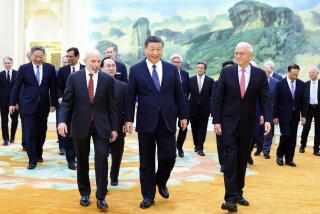Chinese Turn Their Buying Trip Into Sales Effort
- Share via
It was billed as a purchasing mission, but members of a Chinese trade delegation in Los Angeles on Monday also spent much of their time trying to sell companies on the idea of investing in China.
The mission to the United States--a six-city tour by 200 Chinese officials--is the largest from China since that nation’s government routed protesters at Beijing’s Tian An Men Square in June, 1989.
The Los Angeles session, co-sponsored by the City of Los Angeles and held at Mount St. Mary’s College in Los Angeles, was designed to give U.S. firms an opportunity to sell goods and services in China. Representatives of about 150 firms gathered for meetings with members of a delegation led by Huang Wenjun, commercial minister at the Chinese Embassy in Washington. The group’s next stop is Seattle.
Huang and other delegation officials discussed bilateral trade issues, but they also urged executives to examine investment opportunities in China.
“After what happened in Beijing in June last year, some predicted an end to (economic) reform,” Huang said. “China will never turn away from the ongoing process of reform. . . . The reason the reform process will stay in place is simple: The Chinese people have benefited, and any reversal would go against the will of the people.”
Huang said the Chinese government in April took steps to liberalize the economy further. For example, the government decided to allow foreigners to assume the chairmanship of joint ventures with their Chinese partners. Previously, such a venture had to have a Chinese head. Also, the Chinese government promised not to nationalize private ventures, Huang said.
Many of the liberalization measures, some Western observers say, are designed to lure foreign capital. Fearing political instability in the wake of Tian An Men, many potential foreign investors backed away from China. Expressing outrage at the crackdown, governments of the major industrialized nations last year imposed economic sanctions.
However, the Japanese government in July began to resume lending to China. In addition, European Community foreign ministers agreed last week to roll back their economic sanctions.
Huang, in an interview, said many companies began to invest in China by building facilities and joint venture relationships before those sanctions were lifted. Huang had no statistics, but said U.S. and other foreign investment has been rising significantly since May.
Still, more cautious firms and potential lenders in the United States are awaiting a sign from Washington, Huang said.
More to Read
Inside the business of entertainment
The Wide Shot brings you news, analysis and insights on everything from streaming wars to production — and what it all means for the future.
You may occasionally receive promotional content from the Los Angeles Times.










